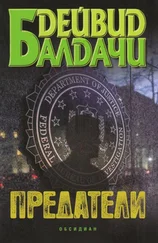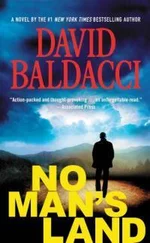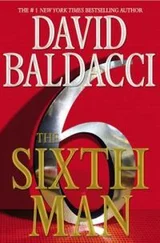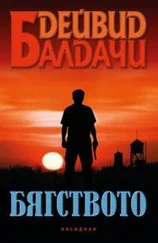“Are they harvesting the olives?” he asked.
“Yep,” replied Dash. “It’s tough work. You pick them by hand. Armstrong probably has about a hundred pickers here now, those folks you see out there. Mostly migrants from Mexico. He doesn’t pay them much, but it’s a lot more than they can make back home. They live in some of those bunkhouses you see around here. Feeds them, too, before he sends them on their way back across the border.”
“Olives grow well around here, I take it.”
“Yes. But it can be tricky. They need a lot of deep, infrequent watering.”
“But you can’t use salt water?”
“No. Armstrong told me one time the saline burns out the tree roots, and compounds coming from it can be toxic to the leaves.”
Archer gazed out at the sea of green, healthy olive trees. “Where does he get his fresh water, then?”
“California has a complicated relationship with water, Archer. Orange growers need a ton of it, the cities need millions of gallons of drinking water every day, and farmers need it for their crops and livestock. There are pipelines and trenches and aquifers and a series of dams and reservoirs collecting water coming off the winter snow packs in the Sierras and the Cascades, and the Rockies, too. And folks fight over it. Some divert it, others outright steal it from their neighbor or duke it out in court. With regard to Armstrong, he’s never divulged his source to me.”
They drove up to the house and got out.
“What do you think he wants to see us about?” said Archer.
“I would imagine his son-in-law and his daughter.”
“And Ruby Fraser?”
“Maybe. We’ll find out soon enough.”
A woman answered the door. She was of Mexican heritage, matronly and reserved, and casually attired in denim jeans with the cuffs rolled up and a colorful flannel shirt with a matching bandana. She told them she was Mr. Armstrong’s housekeeper. And to follow her. And they did. The floors were polished wood and the walls were plaster. It was far cooler inside than out. Archer figured the walls were thick to make that the case. The interior decorations here were far less formal than at the Kempers’ place.
They were led all the way through the house and out onto the back porch, which was just as sweeping as the front. At a round table set off to one side sat Sawyer Armstrong. He had on reflective sunglasses, though the sun was not in his eyes, and the man had just clipped off the end of a fat cigar before lighting and then puffing on it. He wore faded jeans, a white shirt, and a dark green corduroy vest. A straw hat with an olive green band sat on the table. His thick, unruly hair fell nearly to his shoulders. Scuffed boots rode on his long feet. His legs were stretched out. Three glasses and a pitcher of what looked to be sangria were set on the table.
And to Archer’s surprise, Beth Kemper was also seated at the table, next to her father.
He waved them over.
They sat and took off their hats, and the housekeeper went on her way.
Armstrong poured three glasses and handed them out. “Nothing like a little Spanish honey in the afternoon,” he said, taking off his sunglasses and slipping them into a vest pocket.
Archer looked at Kemper. “But not for you?”
She wouldn’t meet his eye. “Sangria gives me migraines. My father insists that I learn to love it, but so far it just hasn’t worked.”
“Love the migraines or the sangria?” asked Archer.
Armstrong interjected, “I think we can move on from the chitchat.”
“Sounds good to me,” said Dash as he took out a pack of cigarettes and lit one. He took a puff and said, “You rang, Armstrong. We’re here. But before we get going.” He pointed to Archer. “Your boys didn’t have to put the hurt on my associate here. That didn’t show class.”
Archer glanced at Kemper, but she displayed no reaction.
To him, the woman was like a flower in full bloom that had wilted to nothing because someone had thrown something toxic on it.
Armstrong nodded. “Yes, Willie, I agree with that. And I’ve had a talk with them both.”
“Good, good. Now, Archer also told me that you want to hire us. Is that why we’re here?”
“In part, yes,” said Armstrong after taking a sip of sangria. “But it’s more than that, too. There was a girl killed up at my place, Midnight Moods.”
“Pickett himself is on the case, which I take to mean that you called him personally. Otherwise, he’d rather be back in his office banging that honey of a secretary.” Dash glanced at Kemper. “Sorry, Mrs. Kemper, that just slipped out.”
She smiled, briefly, then lowered her gaze.
“You don’t have a high opinion of Carl, do you?” said Armstrong.
“I like competence and honesty, and you can throw integrity in there, too, if you want. Carl fails on all three counts in my book. And I’m sure he feels the same way about me, only he’d be wrong and I’d be right. I’m not telling you anything I haven’t told him.”
“I see,” said Armstrong in a noncommittal tone.
“Now, we are looking into Ruby Fraser’s death,” added Dash. “We’d already talked to her because the case we’re handling for your son-in-law involved her.”
“You mean that they were ‘seeing’ each other? As I told Archer, it’s something that my daughter here can ably handle. Though I doubt Beth much cares what Douglas does with his time.”
Archer once more looked at Kemper. She finally lifted her gaze to his and said, “I believe I made my position on that very clear to these gentlemen.”
Her father patted her on the arm. “And it’s your right to do so, of course, Beth. If you remember, I told you to strongly consider not marrying the man, but you inherited your mother’s stubbornness and you went ahead and did it anyway. And now look at where you are.”
Archer watched as the pink rose in the woman’s cheeks, and not in a good way. She looked angry but said nothing.
Dash said, “Regardless, someone was clearly trying to blackmail Kemper into dropping out of the race and using Fraser to do it. Now she’s dead.”
Armstrong sat up a little straighter and finished his glass of sangria. “I hope you’re not implying that Douglas had anything to do with this girl’s murder. I can’t say that I like the man all that much, particularly after the way he’s treated my daughter. But murder? That’s preposterous.”
Archer shot Kemper another glance. There was no expression on the woman’s features. Archer could not reconcile the vivacious, quick-witted woman in the diner with this dull apparition.
“I’m not implying anything,” said Dash. “I’m just saying that he had an obvious motive to get rid of her. And he didn’t have to do the deed himself. There are guys who would do it for him for the right price.” He glanced at Kemper. “Again, I’m sorry. I had no idea you’d be here, but these are things we have to discuss. If you want to leave, this might be a good time.”
Archer saw the indecision on the woman’s face until Armstrong put a big hand on her shoulder. “Beth is strong. She can deal with this, Willie. Isn’t that right, my dear?”
Kemper glanced at Archer before saying, “I’m fine, Mr. Dash, please carry on.”
“All right, ma’am, if you’re sure.”
Armstrong said, “I don’t agree with that theory at all, Willie. Because now that she’s dead, people will assume that Douglas did have something to do with it. And while adultery is not a good look for a politician, murder is far worse. So don’t you see that this is an attempt to push the election to Alfred Drake?”
“So you really think Drake had her murdered?” said Dash, each word draped in more sarcasm than its predecessor.
Читать дальше
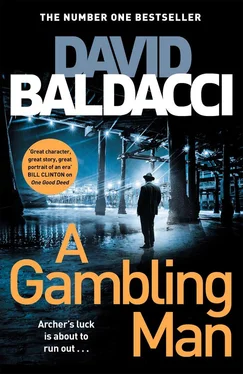
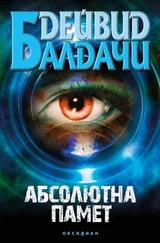

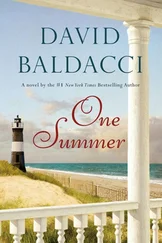
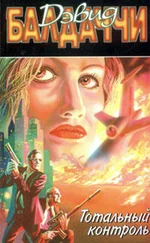
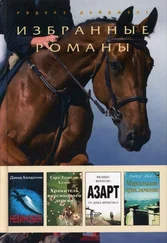
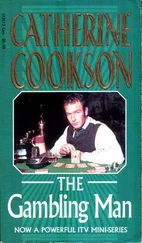

![Дэвид Балдаччи - A Gambling Man [calibre]](/books/384314/devid-baldachchi-a-gambling-man-calibre-thumb.webp)
